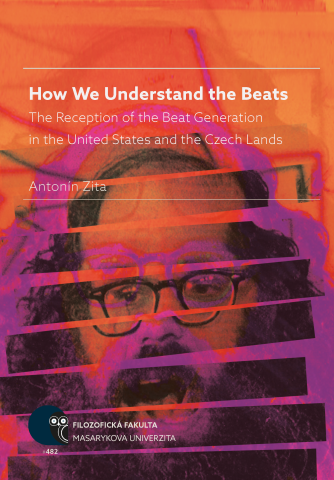Title: How we understand the beats : the reception of the beat generation in the United States and the Czech lands
Edition
First published
Place of publication
Brno
Publisher
Filozofická fakulta, Masarykova univerzita
Year of publication
2018
Extent
200 stran
Series
- Opera Facultatis philosophicae Universitatis Masarykianae = Spisy Filozofické fakulty Masarykovy univerzity, ISSN 1211-3034; 482
ISBN
978-80-210-9048-4
978-80-210-9049-1 (online : pdf)
Persistent identifier (DOI): https://doi.org/10.5817/CZ.MUNI.M210-9049-2018
Stable URL (handle): https://hdl.handle.net/11222.digilib/138841
Language
English
Link to MU library catalogue: 6434975
More
Description
- Kniha se zabývá srovnáním recepce autorů Beat Generation v USA a v Česku, a to ve dvou časových obdobích – v 50. a 60. letech 20. století a poté od 90. let až do současnosti. Zatímco samotné publikace Beat Generation autorů zůstaly nezměněné, kontexty těchto publikací byly zásadně odlišné: v USA byla díla autorů Beat Generation často redukována senzacechtivými kritiky na nevyzrálé vychvalování drog, sexu i násilí, v Československu naopak tito autoři získali přízeň čtenářů díky neobvyklosti svého literárního jazyka, kterou jejich próza a poezie představovaly na literárním trhu značně pokřiveném tezemi socialistického realismu. Tato studie tedy dokládá, jak mohou odlišné kontexty ovlivnit přístup čtenářů k literárnímu textu a jejich autorům, což ve výsledku pomáhá přeměnit daný text na odlišné umělecké dílo.
- The book compares the reception of the Beat Generation authors in the United States and the Czech lands in two different time periods: in the 1950s and 1960s of the 20th century and then from 1990s until today. While the works of the Beat Generation authors remained the same, the contexts of the Beat publications could not have been more different: American critics frequently reduced the works of the Beats to a juvenile promotion of sex, drugs, and even violence; for Czechoslovak readers, the works of the Beats sharply contrasted with the official literature which followed the doctrine of socialist realism. Therefore, this study comments on how different contexts shape the readers' approaches to a literary text and their author, which then in turn help transform said text into a different work of art.
Subject headings
Department FF MU
Topic
License: Not specified license
Rights holder
Antonín Zita
Masarykova univerzita
Rights access
embargoed access
ZITA, Antonín. How we understand the beats: the reception of the beat generation in the United States and the Czech lands. Brno: Filozofická fakulta, Masarykova univerzita, 2018. ISBN 978-80-210-9048-4,978-80-210-9049-1 (online : pdf). Dostupné také z: https://hdl.handle.net/11222.digilib/138841.
Notice: These citations are automatically created and might not follow citation rules properly.
Content
| Chapter number | Title | Custom text |
|---|---|---|
| Motto | 7 Zita, Antonín |
| Chapter number | Title | Custom text |
|---|---|---|
| Acknowledgments | 8 Zita, Antonín |
| Chapter number | Title | Custom text |
|---|---|---|
| 1 | | Introduction to the Beat Generation | 9–23 Zita, Antonín |
| Chapter number | Title | Custom text |
|---|---|---|
| 2 | | Theoretical background | 24–35 Zita, Antonín |
| Chapter number | Title | Custom text |
|---|---|---|
| 3 | | The United States of the fifties and the sixties: an introduction | 36–47 Zita, Antonín |
| Chapter number | Title | Custom text |
|---|---|---|
| 4 | | The reception in the United States: the fifties and the sixties | 48–82 Zita, Antonín |
| Chapter number | Title | Custom text |
|---|---|---|
| 5 | | The reception in the United States: current reception | 83–102 Zita, Antonín |
| Chapter number | Title | Custom text |
|---|---|---|
| 6 | | Czechoslovakia of the fifties and sixties: an introduction | 103–118 Zita, Antonín |
| Chapter number | Title | Custom text |
|---|---|---|
| 7 | | The reception in Czechoslovakia | 119–142 Zita, Antonín |
| Chapter number | Title | Custom text |
|---|---|---|
| 8 | | The reception in the Czech Republic | 143–162 Zita, Antonín |
| Chapter number | Title | Custom text |
|---|---|---|
| 9 | | The reception of the Beat Generation: a discussion | 163–174 Zita, Antonín |
| Chapter number | Title | Custom text |
|---|---|---|
| Conclusion | 175–177 Zita, Antonín |
| Chapter number | Title | Custom text |
|---|---|---|
| Summary | 178–180 Zita, Antonín |
| Chapter number | Title | Custom text |
|---|---|---|
| Zusammenfassung | 181–183 Zita, Antonín |
| Chapter number | Title | Custom text |
|---|---|---|
| Bibliography | 184–197 Zita, Antonín |
| Chapter number | Title | Custom text |
|---|---|---|
| Index | 198–200 Zita, Antonín |

